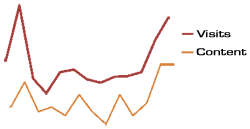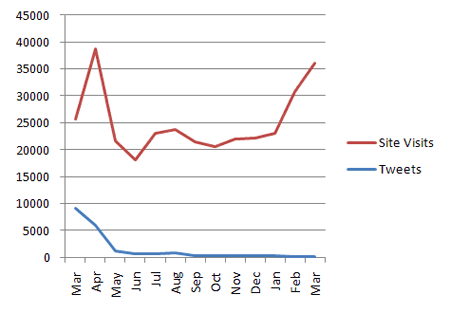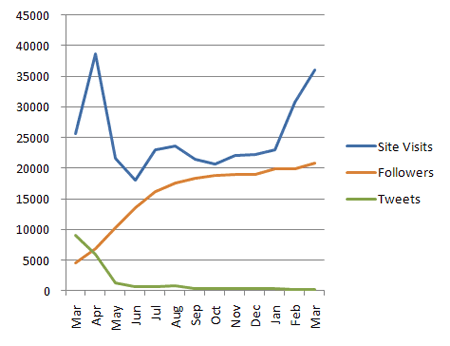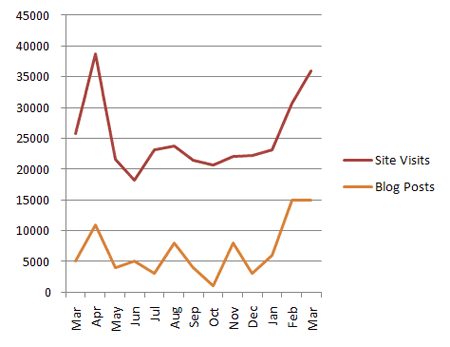
I took a short break from my blog over the past week. I was very busy with other projects, and it gave me some time to consider why I blog and the benefits I receive from it. While I was away, I thought about some less obvious ways it helps me in my business. Some obvious benefits to a blog are easy to list, in fact, here are 10 really good reasons to blog. I want to share a couple additional benefits I consider to be extremely important, and perhaps you can relate to these as well. If you have a blog, I want you to think about those ways it benefits you and how you can further harness those benefits. If you do not have a blog or you are not blogging enough, I want to give you positive encouragement and help you recognize reasons you should.
Blogging as a Thought Portfolio
I want more business, and I know a lot of people feel the same way. In my case, I do not just want more business … I want better business. Blogging helps me to achieve this, because it allows my potential clients to have a better understanding of my work as a marketing guy. It allows people to know a whole lot about what I do and how I do it, before they even pick up the phone and call me. It provides excellent proof that I really know what I am doing with SEO, social media, and other Internet marketing topics. Here is my blog archive. It is like a window to my mind as it relates to my work. The people who spend a lot of time here before they call me are always better clients, because they already know we will make a good fit. That means better business, and not just more business.
Think about how blogging could benefit you in this way. Regardless of your industry, being useful to others and showing what you know and how you think can be very attractive to potential customers … the best customers.
Blogging as a Sales Tool
I am not the salesman type. I give great factual data and I let people make decisions based on real information. I like for people to make their own decisions. People who cannot see the benefits of my marketing services without my having to poke and prod them with a big sales pitch do not make good clients for me. If a business relationship begins with a salesperson pushing to convince somebody to buy, you can bet there will be a lot of hassle down the road.
I realized a long time ago that chatting somebody’s ear off to sell them something they are unsure of is about the last thing I could ever hope to do for a living. I think I would rather be a professional house mover, and with this body, I don’t see that happening.
Even when people email me or call me, I can often either reference something I already produced on my blog or give them an article to read about the given topic. Having so many of my thoughts and ideas laid out on my blog and indexed nicely by Google makes an invaluable tool when I need to answer a question for somebody. Just having written the information also makes it easier for me to have words to answer the question.
Give it some thought about how your blog or other website may be an excellent sales tool beyond just those nameless and faceless people on the Internet. You may find a blog to be extremely useful, because it already says all the things you want to say, and can prevent a lot of wasted breath. In my case, I find that if somebody is not willing to do some recommended reading about what I offer, they are probably not too serious about doing business with me anyway.
Other Blogging Benefits and Tools
Blogging holds extremely high value when it comes to search engine optimization (SEO) and it is at the core of good social media marketing. If you feel that you just don’t have the time for it, by all means, hire it out. If you feel that blogging is not important or does not have a benefit in store for you, reading the following articles will surely convince you otherwise. I am confident that there is information in these past articles on my blog that will provide value to you and help your business pursuits. Take a moment and find out for yourself.
- 10 Really Good Reasons to Blog
If you think blogging is just for geeks or those with extra time on their hands, think again! If you ever wondered if you should be blogging, or why to continue blogging, this list will give you very strong reasons. - Produce More Website Content … But Why? SEO?
More website content means more things for people to find in a Google search, but it goes a bit deeper than just that. - Blogging Improves Intelligence and Here is Proof!
Blogging can increase your business intelligence, expand your creativity, provide you with a better perspective on the intelligence around you, and more. Much relies on how you use it, and I am here to help you get smarter, so stop scanning and start reading! - Twitter is Useful but Blogging is Better
This article shows a statistical analysis of how blogging provides more value than any single social media effort alone. - 6 Essential Blogging Tools for Non-Bloggers and Bloggers
Even if you are just a casual reader, I want to give you some really useful pieces of information to help you receive more benefit from blogs and to make the information more manageable. These will not take a lot of time to implement, and it will be worth the time you spend.



